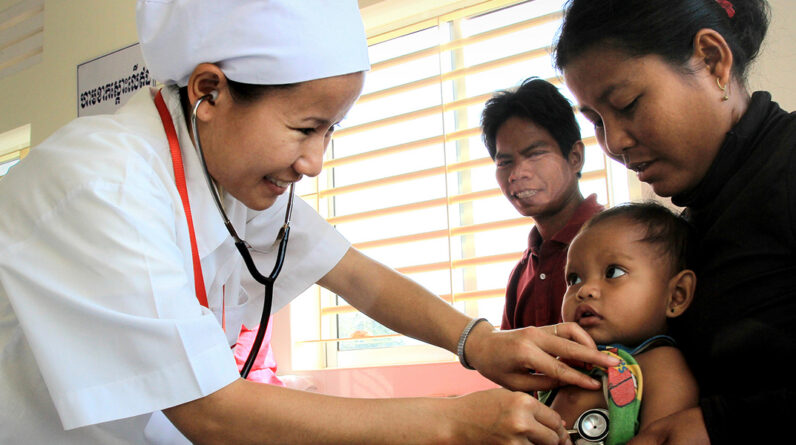
International Universal Health Coverage Day is observed on December 12 to promote access to quality and affordable healthcare for all individuals worldwide. This day aims to raise awareness about the importance of universal health coverage and advocate for policies that enable everyone to receive the necessary healthcare services without facing financial hardships.
Universal health coverage ensures that individuals and communities can access essential health services, including promotion, prevention, treatment, and rehabilitation, without experiencing financial difficulties. This comprehensive approach to healthcare seeks to address health inequalities and ensure that no one is left behind in receiving the care they need.
On International Universal Health Coverage Day, various events and campaigns are organized to highlight the progress made and to accelerate actions towards achieving universal health coverage globally.
The Impact Of Universal Health Coverage On Global Health
Universal Health Coverage (UHC) has had a significant impact on global health by ensuring improved access to healthcare services, reducing health disparities, and preventing and controlling diseases. As countries strive to achieve UHC, access to healthcare services has improved, allowing more individuals to receive the care they need.
This has resulted in a decrease in health disparities, as marginalized populations now have equal opportunities to access healthcare. Furthermore, UHC programs focus on the prevention and control of diseases, emphasizing the importance of early detection and intervention.
By doing so, the burden of illness is reduced, and individuals and communities can lead healthier lives. One of the critical benefits of UHC is the financial protection it provides to individuals and families, ensuring that healthcare expenses do not push them into poverty.
Overall, the adoption of UHC has been instrumental in addressing global health challenges and creating a more equitable and sustainable healthcare system.
International Efforts Towards Universal Health Coverage
Universal Health Coverage (UHC) is a global effort to ensure that everyone, everywhere, can access quality healthcare. The World Health Organization (WHO) is crucial in promoting UHC as part of its commitment to achieving Sustainable Development Goal 3 – Good Health and Well-being.
Under Sustainable Development Goal 3, countries have pledged to achieve UHC by 2030. This means that by that year, everyone should have access to essential health services without financial hardship. The WHO provides technical support and guidance to countries to implement UHC, including strengthening health systems, improving healthcare financing, and expanding health coverage.
In addition to the WHO, several global initiatives and partnerships are working towards healthcare access for all. These include the Global Health Security Agenda, the Global Fund to Fight AIDS, Tuberculosis and Malaria, and Gavi, the Vaccine Alliance. These initiatives aim to address specific health challenges and work towards achieving UHC by collaborating with governments, organizations, and communities around the world.
| World Health Organization’s role: | Promoting UHC |
| Sustainable Development Goal 3: | Achieve UHC by 2030 |
| Global Initiatives and Partnerships: | Global Health Security Agenda, Global Fund, Gavi |
Success Stories Of Countries In Achieving Universal Health Coverage
International Universal Health Coverage Day celebrates the progress made by various countries in achieving universal health coverage (UHC) and highlights the importance of accessible and affordable healthcare for all individuals. Numerous countries have successfully implemented UHC systems, providing valuable insights into the strategies and policies that contribute to their success.
1. Thailand: Thailand’s UHC system is recognized worldwide for its effectiveness. The government invested in infrastructure, healthcare facilities, and healthcare workforce development. They also implemented a financing system that combines taxes, national health insurance, and cost-sharing mechanisms.
2. Rwanda: Rwanda significantly improved its healthcare system post-genocide by implementing a community-based health insurance scheme. With this approach, they achieved impressive coverage rates by focusing on prevention and primary healthcare services.
3. Germany: Germany operates a social health insurance system where citizens contribute a percentage of their income toward insurance premiums. This approach ensures comprehensive coverage and high-quality care. The government also prioritizes health promotion and disease prevention.
4. Japan: Japan’s UHC system is characterized by a mandatory public health insurance program and regulated healthcare fees. The country strongly focuses on primary care, which helps control healthcare costs and provides accessible care to all residents.
These successful examples highlight the importance of investing in infrastructure, developing robust financing systems, promoting primary healthcare, and ensuring community involvement. By learning from these models, countries can progress towards achieving UHC and providing equitable healthcare for their populations.
Challenges Faced In Achieving Universal Health Coverage Globally
Challenges Faced in Achieving Universal Health Coverage Globally
The goal of achieving universal health coverage (UHC) worldwide is met with several challenges that hinder progress. Financing healthcare systems is a significant hurdle, as many countries struggle to allocate sufficient funds to provide quality healthcare to all citizens.
Limited investments in health infrastructure and resources, particularly in low-income countries, further compound the problem. These nations often lack the necessary facilities, medical equipment, and trained healthcare professionals to meet the needs of their populations adequately.
| Challenges | Possible Solutions |
|---|---|
| Financing healthcare systems | Increased government funding, public-private partnerships |
| Health workforce shortages | Investments in healthcare education, training, and recruitment |
| Lack of infrastructure and resources in low-income countries | International aid, infrastructure development initiatives |
Addressing these challenges calls for collaborative efforts from governments, international organizations, and stakeholders to ensure that everyone has access to affordable and quality healthcare services. By addressing the financing gap, investing in the health workforce, and improving infrastructure in low-income countries, progress toward achieving UHC can be made.
Strengthening Health Systems
On International Universal Health Coverage Day, it is crucial to focus on strengthening health systems to ensure accessible and quality healthcare for all. One key area of improvement is in primary healthcare services, which serve as the first point of contact for individuals seeking healthcare. By enhancing direct healthcare services, countries can address various health issues, prevent diseases, and effectively manage chronic conditions.
Investing in health infrastructure and a well-trained healthcare workforce is essential for delivering effective primary healthcare services. This includes ensuring the availability of healthcare facilities, equipment, and medical supplies. Additionally, training and retaining skilled healthcare professionals such as doctors, nurses, and community health workers will improve the delivery of primary healthcare services, especially in underserved areas.
Another critical aspect of strengthening health systems is enhancing health financing mechanisms. This involves developing sustainable funding models that adequately allocate resources to primary healthcare. By prioritizing and adequately funding direct healthcare services, countries can reduce barriers to healthcare access, such as high out-of-pocket costs, and ensure financial protection for individuals seeking healthcare.

Credit: www.csis.org
Promoting Health Equity And Inclusion
International Universal Health Coverage Day is a momentous occasion that highlights the significance of promoting health equity and inclusion on a global scale.
One key aspect of achieving universal health coverage is addressing the social determinants of health. These determinants include socioeconomic status, education, and access to clean water and sanitation. By recognizing and tackling these root causes, we can create a more equitable healthcare system that benefits all individuals, regardless of their backgrounds or circumstances.
Ensuring equal access to healthcare for vulnerable populations is another critical goal. This includes providing healthcare services and resources to marginalized communities, such as low-income individuals, racial and ethnic minorities, and people with disabilities. By prioritizing their needs and removing barriers to healthcare, we can support the overall health and well-being of these populations.
Engaging communities in healthcare decision-making is essential for fostering inclusivity and improving health outcomes. By involving individuals in the decision-making process, healthcare providers and policymakers can gain valuable insights and feedback. This approach encourages collaboration and empowers communities to actively participate in shaping their healthcare systems.
International Collaboration For Universal Health Coverage
International collaboration is crucial for achieving universal health coverage (UHC) worldwide. By sharing best practices and lessons learned, countries can develop effective strategies to improve healthcare access and quality for all individuals.
This collaboration also involves mobilizing resources and support from international organizations such as the World Health Organization (WHO) and the United Nations (UN), vital in facilitating UHC initiatives.
Additionally, coordinating efforts and aligning policies among countries is necessary to ensure a cohesive global approach towards UHC. This requires ongoing communication and collaboration to identify common goals and strategies.
The Importance Of Universal Health Coverage In Addressing Global Health Challenges
The Importance of Universal Health Coverage in Addressing Global Health Challenges
Universal Health Coverage (UHC) is crucial in promoting equitable access to quality healthcare services for all without causing financial hardship. UHC encompasses a range of services, including promotive, preventive, curative, and rehabilitative care, essential medicines, and vaccines. It assures that no one is left without adequate healthcare due to financial barriers.
By achieving UHC, countries can contribute to sustainable development and economic growth. Healthy individuals and communities are the foundation of prosperous societies. UHC leads to increased productivity, reduced healthcare costs, and improved overall well-being. It allows individuals to seek timely and appropriate care, preventing the progression of diseases and reducing long-term healthcare expenses.
UHC also strengthens health systems, enabling effective responses to global health challenges. It ensures resilient healthcare infrastructure, robust financing mechanisms, qualified healthcare professionals, and equitable distribution of resources. Through UHC, countries can better respond to emerging health threats, epidemics, and other health emergencies, fostering global health security.
Dates of International Universal Health Coverage Day
| Year | Date | Day |
|---|---|---|
| 2023 | December 12 | Tuesday |
| 2024 | December 12 | Thursday |
| 2025 | December 12 | Friday |
| 2026 | December 12 | Saturday |
| 2027 | December 12 | Sunday |
Frequently Asked Questions On International Universal Health Coverage Day
What Is International Universal Health Coverage Day?
International Universal Health Coverage Day is a global observance highlighting the importance of accessible and affordable healthcare for all individuals and communities. It raises awareness about the significance of universal health coverage in achieving sustainable development and ensuring the well-being of everyone.
On this day, various events and activities are organized to promote universal health coverage worldwide.
Why Is International Universal Health Coverage Day Celebrated?
International Universal Health Coverage Day is celebrated to advocate for equal access to quality healthcare for all individuals, regardless of their socio-economic background. It aims to mobilize action and support from governments, organizations, and individuals in achieving universal health coverage.
By raising awareness about this crucial issue, the day is a platform to promote policies and initiatives that improve healthcare systems globally.
How Does Universal Health Coverage Benefit Individuals And Communities?
Universal health coverage ensures that everyone can access the healthcare they need without facing financial hardship. It protects against high medical costs and ensures people receive essential health services, including preventive, curative, and rehabilitative care.
By promoting equitable healthcare, universal health coverage improves the overall health outcomes of individuals and communities, reducing health inequalities and contributing to social and economic development.
What Are The Main Challenges In Achieving Universal Health Coverage?
Achieving universal health coverage faces several challenges, including inadequate financing, insufficient healthcare infrastructure, unequal access to services, and a shortage of healthcare professionals.
Additionally, political and social barriers, such as corruption and exclusionary policies, hinder progress towards universal health coverage. Overcoming these challenges requires concerted efforts from governments, international organizations, and communities to implement effective policies, ensure sufficient funding, and address underlying systemic issues.
Conclusion
In the fight for accessible healthcare, International Universal Health Coverage Day holds significant importance. It serves as a reminder of the ongoing efforts to ensure that everyone, regardless of their income or location, can access healthcare services without facing financial hardship.
As we move forward, let us continue to advocate for universal health coverage, working towards a future where quality healthcare is a fundamental right for all.






